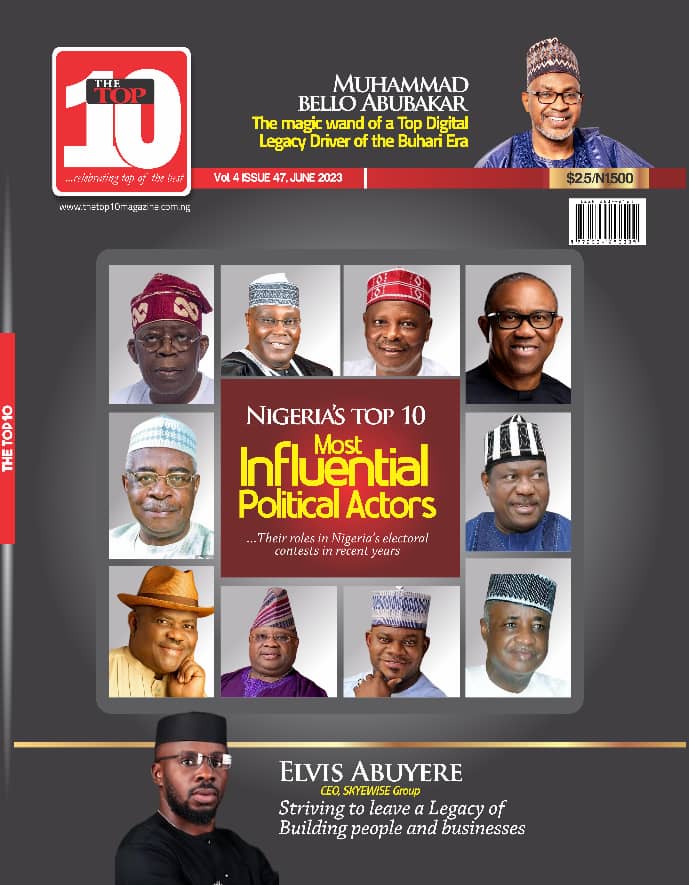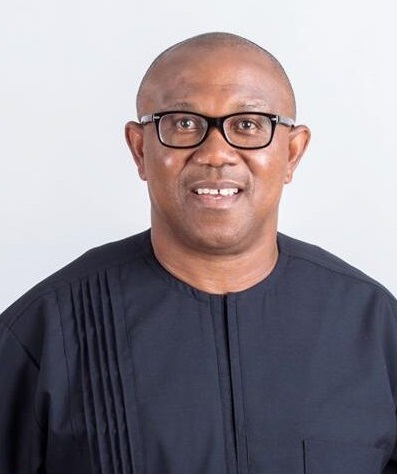The case of Peter Obi is the story of the most dramatic sprint in the history of Nigeria’s presidential race. The former Anambra state Governor started the race in the Peoples Democratic Party (PDP) without any prospect of picking the party’s ticket. But just a few months later he almost breasted the tape on the finishing line.

In PDP, in spite of his political pedigree and integrity, it was obvious that he stood no chance against deep-pocket contenders, particularly the former Nigerian Vice-President and perennial Presidential candidate, Alhaji Atiku Abubakar, with whom he ran as presidential running mate in 2019. When this magazine did a cover story on the Top 10 presidential aspirants for the 2023 elections, just before the party primaries, Obi was in the category of the also-rans. The magazine said:
“There are currently 18 registered political parties in Nigeria but the two dominant ones are the All Progressives Congress (APC), the ruling party at the national level, and the main opposition Peoples Democratic Party (PDP). While most of the parties are expected to field presidential candidates for next year’s election, it is only APC and PDP and their presidential aspirants that are enjoying the limelight. They are the ones well organized to win the presidency and are, therefore, the central focus of Nigerians and this publication.”
Obi quit PDP and picked the presidential ticket of Labour Party (LP), which was hitherto relatively unknown. It had no sitting Governor or National Assembly member and lacked presence in many states, Local Governments and Council Wards across the country.
About the same time, Senator Rabiu Musa Kwankwaso, another presidential aspirant also quit PDP to become the presidential flagbearer of the New Nigeria People’s Party (NNPP). Pundits advised Obi and Kwankwaso to merge or align LP and NNPP, with one of them as presidential candidate and the other as running mate, for them to make any impact at the polls. In response, there was a brief political romance that yielded neither merger nor alliance. They went their separate ways.
That was when Obi’s dramatic sprint in the Presidential race began, with barely right months to the polls. Nigerian youths picked him up as their model political leader and hope for the future of their country. They deployed all social media platforms and communication channels to mobilize themselves and other adult population who were disenchanted with the country’s political past and status quo and wanted to chart a new future Nigeria’s political future. Before you knew it, top politicians from APC, PDP and other fringe parties were falling over each other in defecting to Labour Party. The great ‘Obidients’ movement was born. And it gathered momentum both in Nigeria and abroad with overwhelming endorsements and fundraising activities to beef up his relatively lean political war chest.
Obi’s heavy social media presence began to be complemented with heavy crowds at his political events or wherever he went. The surge in his support base and followership was becoming unprecedented in the build-up to the February 25, 2023 polls.
APC and PDP, as well as their supporters, began to take Obi seriously. They derided him as a social media candidate without physical presence and political structures. They devoted considerable attention and resources to de-marketing Obi and his Labour Party, having realized he was becoming a threat to their victory. But the more they moved against Obi, the more he closed in on them.
Pre-election polls conducted between September 2022 and February 2023 showed Obi cruising neck-and-neck with the previously top two rated candidates – Alhaji Atiku Abubakar of PDP and Asiwaju Bola Tinubu of APC – in their chances of victory.
In its last edition before the February 25 election, this magazine wrote about the standings of the Top Four in the presidential race: “Taking a poll of the six polls and projections presented above, it would appear on the surface that Obi is rated number 1, winning in three out of the six polls. Obi ranked first in the NOI/ANAP and Bloomberg and We2geda polls while Tinubu came top in the EIU and Fitch polls. Atiku clinched first position only in the ThisDay projection…Kwankwaso failed to clinch the top spot in any one of them; in fact, he took the rear in all the polls and projections.”

The results of the election fairly accurately reflected the polls ratings, confirming Obi’s arrival at Nigeria’s political big stage. He came third with 25% of the votes cast after Tinubu (37%) and Atiku (29%). The three of them won 12 states each outright with Obi adding the FCT to his tally.
Obi and his supporters as well as many others believe that Obi actually won the election but was manipulated out of victory. Like Atiku, the first runner-up, Obi has filed a petition before the Presidential Election Tribunal to challenge the declaration of Tinubu as the winner – and his challenge should be taken seriously. Thrice, he was denied the mandate as Anambra state Governor, unjustifiably as it turned out, and thrice he retrieved it through the courts.
The political influence which has taken Obi to the pinnacle of national politics has also helped others to secure victory in the 2023 general elections. Largely on account of the influence of the Presidential candidate, Labour Party won 8 Senate and 36 House of Representatives seats, making the party the third with the highest number of seats in the forthcoming National Assembly. Obi’s influence has helped the party to win a Governorship seat (Abia state) for the first time.
Obi’s rise to the position of national political reckoning came at the instance of his reputation for stainless and outstanding performance in his private sector career as well as during his public service stint as Governor of Anambra State for eight years. Most of the honours and recognitions awarded him since then derive from this reputation. Take the roll: Man of the Year, The Sun Newspaper, 2007; Most Prudent Governor in Nigeria, Thisday Newspaper, 2009; Nigeria’s Most Trustworthy Governor, Champion Newspaper, 2009; Governor of the Year, West Africa ICT Development Award, 2010; Zik Leadership Prize, 2011; Best Performing Governor on Immunization in South-East Nigeria, Bill & Melinda Gates Foundation, 2012; Leadership and Good Governance Award, Ezeife Leadership Foundation, 2012; Golden Award on Prudence, Methodist Church of Nigeria, 2012; Man of the Year, Business Hallmark Newspaper, 2012; Man of the Year, Silverbird, 2013; Award for Outstanding Example in Leadership and Governance, The Voice Newspaper, 2014; Most Outstanding Igbo Man of the Decade, Champion Newspaper, 2014; and the Golden Merit Award, Nigerian Library Association, 2014.
Obi’s stainless credentials became an issue when he was nominated as a Presidential running mate in the 2019 general elections. His critics called him a desperado for a well-adjusted and seemingly pristine person like him to accept the role of a running mate to an individual who was notorious for his baggage.
Peter Obi was born on 19th July 1961 at Onitsha. He had his secondary school education at Christ the King College, Onitsha. In1980, Obi proceeded to University of Nigeria, Nsukka where he graduated with a B.A(Hons) in Philosophy in 1984.
Afterwards, his love for academic pursuit took him outside the shores of Nigeria to Ivy League and Oxbridge schools. He is an alumnus of Harvard Business School, Boston, USA; London School of Economics where he studied Financial Management/BusinessPolicy; Columbia Business School, New York, USA (Marketing Management); Institute
for Management and Development, Switzerland; Kellogg Graduate School of Management, USA, Oxford University and Cambridge.
Before his adventure into politics, Peter Obi was already a successful businessman. He held high profile positions in several establishments. Some of the companies he served include: Next International Nigeria Ltd; Guardian Express Mortgage Bank Ltd; Guardian Express Bank Plc; Future View Securities Ltd; Paymaster Nigeria Ltd; Chams Nigeria Ltd; Corp Ltd and Card Centre Ltd. He was the youngest chairman of Fidelity Bank Plc.
In addition to the aforementioned, he was appointed by former President Goodluck Jonathan as the Chairman of the Securities and Exchange Commission (SEC). Peter Obi is also a member of the Nigerian Economic Summit Group (NESG), the Chartered Institute of Bankers of Nigeria, and the British Institute of Directors (IOD).
Obi tied the knot with Margaret Brownson Usen in 1992 and they are blessed with twochildren: Gabriella Nwamaka Frances Obi and Gregory Peter Oseloka Obi.
Obi began his political career in 2003 when he contested for Anambra State governorship election under the platform of All Progressives Grand Alliance (APGA).
The Independent National Electoral Commission (INEC) declared his opponent, Dr. Chris Ngige, of PDP winner but Obi challenged the result in court for almost three years. Eventually, Ngige’s victory was overturned by the court of appeal on 15 March, 2006.
Obi then took over on 17 March, 2006. After seven months in office, the State House of Assembly, dominated by the hostile opposition party in the state, impeached him. Mrs. Virginia Etiaba, his Deputy, was sworn-in in his place, making her the first female Governor in Nigeria’s history.
But Obi challenged his impeachment in the court of appeal and won and on February 9, 2007, and was re-instated as the Governor.
Again, Obi left the governorship position on May 29, 2007 after the general elections, which Andy Uba won. As a determined elite, Obi contested Uba’s election in court, arguing that he did not complete his four-year tenure and that his tenure started running when he took office in March 2006.
After Obi’s first term, he contested again in the 2010 gubernatorial election and defeated his opponent, Professor Charles Soludo, the former CBN governor. He remained the Governor of Anambra for another four-year term before handing over to Willie Obiano in 2014.
During the 2019 Presidential elections, Peter Obi was named the running mate to Atiku Abubakar, PDP’s Presidential candidate on October 12, 2018. Unfortunately, they lost to the incumbent President, Muhammadu Buhari.
As stated earlier, Peter Obi’s unique selling point in the presidential race was his integrity
and credibility. Femi Akintunde-Johnson, a public affairs commentator, says “…Obi appears like one of the brightest persons that should lead these disparate nations blithely called Nigeria into the next decade:well educated, well trained, well prepared; he comported himself above average in governance; andremarkably prudent in the management of state resources.
Obi’s network of friends, associates and supporters across the country over the years during his service in the private and public sectors. That network was boosted when he crisscrossed the country on a campaign stump as the presidential running mate to Alhaji Abubakar Atiku of PDP in 2019.






